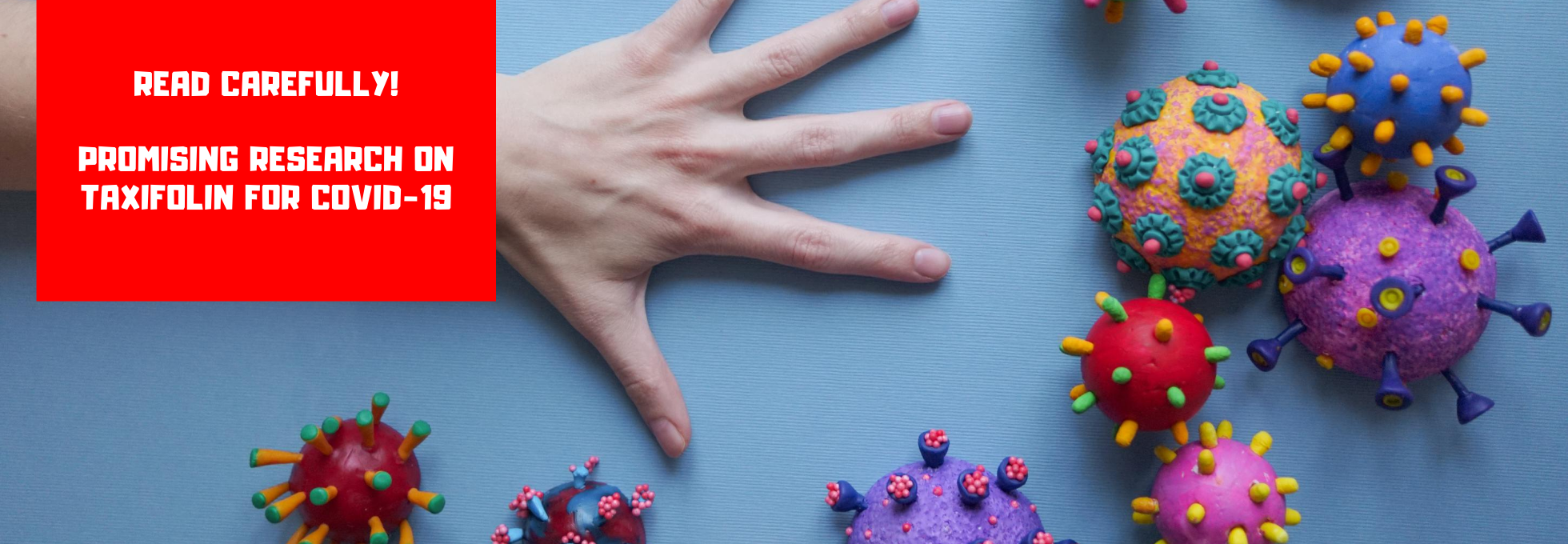WHAT DOES TAXIFOLIN JOINT WITH COVID-19?
The following information was collected from a portal of researchers and specialists from around the world involved in scientific research, which contains thousands of studies on discoveries related to physical and mental health and the technologies used to protect life and health.
Attention!
The scientific research presented is not medical, medical, or pharmaceutical advice. The content posted on the websites www.taxipharm.pl and www.taxipharm.eu are for information purposes only, they cannot be treated as a form of medical consultation and cannot replace the consultation of a doctor who is in charge of the final decision on the method and scope of treatment.
A team from the Swiss Faculty of Pharmaceutical Sciences at the University of Basel, led by André Fischer, Manuel Sellner, Santhosh Neranjan, Markus A. Lill, and Martin Smieško, has provided the study development free of charge, which is the most comprehensive screening calculation for SARS to date. Of the 687 million compounds, they began looking for substances that would be able to inhibit the SARS-CoV-2 protease. (Proteases play an important role in many processes such as fertilization, digestion, growth, maturation, aging, and even death of the body. These enzymes regulate numerous physiological processes by controlling activation, synthesis, and degradation of proteins. They also play an important role in the replication and spread of viruses, bacteria and parasites. They are responsible for the effective transmission of the disease caused by these pathogens).
Using computer-aided methods, Basel researchers have tested tens of millions of substances over the past few weeks to determine if they bind to the most important SARS-CoV-2 protease. The research group decided to immediately disclose their results to the public as an open-source in relation to the current crisis. The publication was read more than 3,000 times in the first 48 hours. Scientists hope that other research groups will take their suggestions, test them on the virus, and start further research.
To date, no specific drugs or vaccines are available for the treatment of SARS-CoV-2, despite its close association with the SARS-CoV-1 virus, which caused a similar epidemic in 2003. Therefore, there is an urgent need to develop specific antiviral drugs to overcome SARS-CoV-2.
To find new inhibitors, an electronic library of compounds containing over 687 million compounds was searched for binding to the crystal structure of the main SARS-CoV-2 protease. Screening such a large chemical space for SARS-CoV-2 protease inhibitors has not been undertaken before. After checking the shape, two docking protocols were used, and then pharmacokinetically relevant molecular descriptors were determined to narrow initial hits to confirm the stability of docked binding modes and to fully estimate ligand binding energy. A list of 11 compounds was isolated. Taxifolin was among them. Taxifolin larch, according to the researchers, may also inhibit the main coronavirus protease.
Taxifolin is a flavonoid found in larch. It is remarkable that Taxifolin has 7 hydrogen bonds, which was the largest number of active substances selected by the Swiss University of Basel. The more hydrogen bonds, the wider the coupling. The number of hydrogen bonds is a key factor. More specifically, hydrogen atoms have strongly positively charged partial charges. This type of partial charge is responsible for the fact that a hydrogen atom can connect to an adjacent molecule by attaching to a single pair of electrons (negative charge). In other words, the combination of taxifolin with the main SARS-CoV-2 protease blocks it and thus stops or does not cause the virus to multiply.
Larch taxifolin is a plant substance-free of side effects, showing no toxicity. It has been approved by EFSA (European Food Safety Authority) as a safe measure for humans. It is used in dietary supplements and is intended for daily supplementation. It also has antibacterial and anti-inflammatory effects. In vivo experiments with taxifolin also showed activity against other viruses such as the Coxsackie B4 virus. These viruses mainly cause colds, viral meningitis and myocarditis.
The original version of the study in English is available here:
